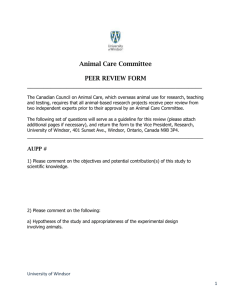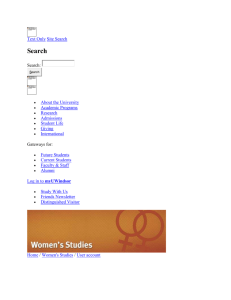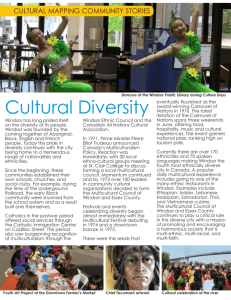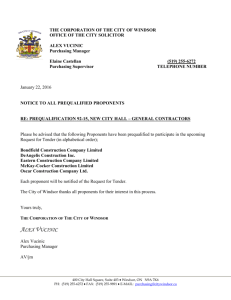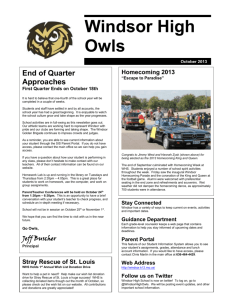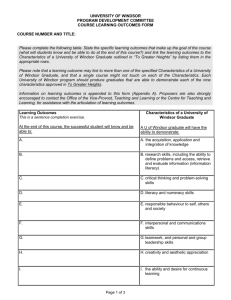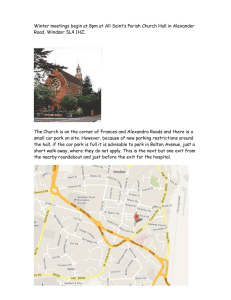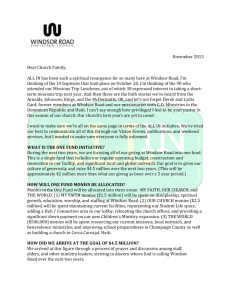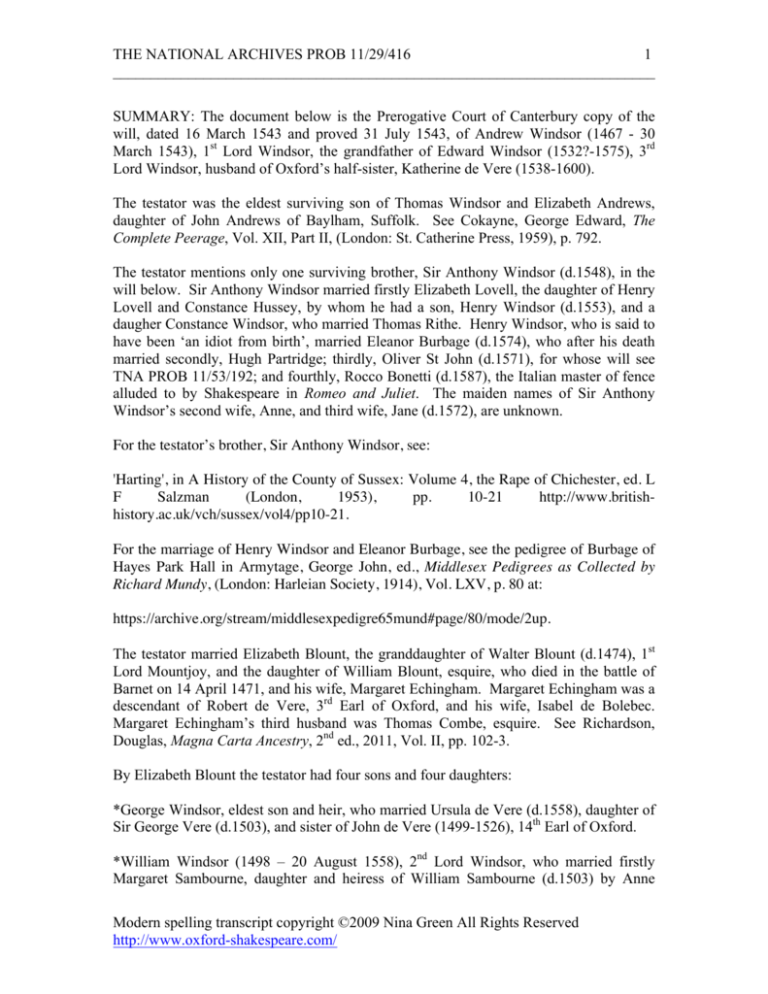
THE NATIONAL ARCHIVES PROB 11/29/416
1
________________________________________________________________________
SUMMARY: The document below is the Prerogative Court of Canterbury copy of the
will, dated 16 March 1543 and proved 31 July 1543, of Andrew Windsor (1467 - 30
March 1543), 1st Lord Windsor, the grandfather of Edward Windsor (1532?-1575), 3rd
Lord Windsor, husband of Oxford’s half-sister, Katherine de Vere (1538-1600).
The testator was the eldest surviving son of Thomas Windsor and Elizabeth Andrews,
daughter of John Andrews of Baylham, Suffolk. See Cokayne, George Edward, The
Complete Peerage, Vol. XII, Part II, (London: St. Catherine Press, 1959), p. 792.
The testator mentions only one surviving brother, Sir Anthony Windsor (d.1548), in the
will below. Sir Anthony Windsor married firstly Elizabeth Lovell, the daughter of Henry
Lovell and Constance Hussey, by whom he had a son, Henry Windsor (d.1553), and a
daugher Constance Windsor, who married Thomas Rithe. Henry Windsor, who is said to
have been ‘an idiot from birth’, married Eleanor Burbage (d.1574), who after his death
married secondly, Hugh Partridge; thirdly, Oliver St John (d.1571), for whose will see
TNA PROB 11/53/192; and fourthly, Rocco Bonetti (d.1587), the Italian master of fence
alluded to by Shakespeare in Romeo and Juliet. The maiden names of Sir Anthony
Windsor’s second wife, Anne, and third wife, Jane (d.1572), are unknown.
For the testator’s brother, Sir Anthony Windsor, see:
'Harting', in A History of the County of Sussex: Volume 4, the Rape of Chichester, ed. L
F
Salzman
(London,
1953),
pp.
10-21
http://www.britishhistory.ac.uk/vch/sussex/vol4/pp10-21.
For the marriage of Henry Windsor and Eleanor Burbage, see the pedigree of Burbage of
Hayes Park Hall in Armytage, George John, ed., Middlesex Pedigrees as Collected by
Richard Mundy, (London: Harleian Society, 1914), Vol. LXV, p. 80 at:
https://archive.org/stream/middlesexpedigre65mund#page/80/mode/2up.
The testator married Elizabeth Blount, the granddaughter of Walter Blount (d.1474), 1st
Lord Mountjoy, and the daughter of William Blount, esquire, who died in the battle of
Barnet on 14 April 1471, and his wife, Margaret Echingham. Margaret Echingham was a
descendant of Robert de Vere, 3rd Earl of Oxford, and his wife, Isabel de Bolebec.
Margaret Echingham’s third husband was Thomas Combe, esquire. See Richardson,
Douglas, Magna Carta Ancestry, 2nd ed., 2011, Vol. II, pp. 102-3.
By Elizabeth Blount the testator had four sons and four daughters:
*George Windsor, eldest son and heir, who married Ursula de Vere (d.1558), daughter of
Sir George Vere (d.1503), and sister of John de Vere (1499-1526), 14th Earl of Oxford.
*William Windsor (1498 – 20 August 1558), 2nd Lord Windsor, who married firstly
Margaret Sambourne, daughter and heiress of William Sambourne (d.1503) by Anne
Modern spelling transcript copyright ©2009 Nina Green All Rights Reserved
http://www.oxford-shakespeare.com/
THE NATIONAL ARCHIVES PROB 11/29/416
2
________________________________________________________________________
Copley, daughter of Roger Copley, and secondly Elizabeth Cowdray or Coudray, widow
of Richard Paulet and second daughter of Peter Cowdray by his second wife Dorothy
White, daughter of Thomas White. By his first wife, Margaret Sambourne, William
Windsor was the father of Edward Windsor (1532?-1575), 3rd Lord Windsor, who
married Oxford’s half-sister, Katherine de Vere (1538-1600). For the will of William
Windsor (1498 – 20 August 1558), see TNA PROB 11/42A/91.
*Edmund Windsor.
*Thomas Windsor.
*Elizabeth Windsor, who married Sir Peter Vavasour (d. in or after 1556) of Spaldington,
Yorkshire.
*Anne Windsor (d.1551), who married Roger Corbet (d.1538).
*Edith Windsor, who married George Ludlow, esquire (d.1580), by whom she had two
sons and six daughters.
*Eleanor Windsor, who married firstly Ralph Scrope (d. 17 September 1515), 9th Lord
Scrope of Masham or Upsall, by whom she had no issue, and secondly, Sir Edward
Neville, by whom she had two sons, Edward Neville (d.1589), 7th Lord Abergavenny,
and Sir Henry Neville (c.1520–1593), and five daughters: Katherine Neville, who
married Clement Throckmorton (c.1515 – 14 December 1573), by whom she had six sons
and seven daughters, including Job Throckmorton (1545–1601), who assisted in the
publication of the Marprelate tracts; Mary Neville, who married Henry Dyneley; Frances
Neville (1518/19–1599), who married Sir Edward Waldegrave (1516/17–1561); Gertrude
Neville; and Elizabeth Neville, who married Thomas Eymes, esquire. According to
Richardson, infra, Sir Edward Neville was beheaded 9 January 1539; however according
to the ODNB entry, he was beheaded 9 December 1538. According to Richardson, infra,
his wife, Eleanor Windsor, died before 25 March 1531; however according to the ODNB
entry, she survived him.
See Richardson, Douglas, Plantagenet Ancestry, 2nd edition, 2011, Vol. I, pp. 242-3, and
Vol. II, pp. 470-2 and 659; entries in the ODNB for Sir Edward Neville (beheaded
1538/9), Edward Neville (d.1589), 7th Lord Abergavenny, Sir Henry Neville (c.1520–
1593), Sir Edward Waldegrave (1516/17-1561), Job Throckmorton (1545-1601), and
Thomas Vavasour (d. 1585); and the wills of William Windsor, (1498-1558), 2nd Lord
Windsor, TNA PROB 11-42A, ff. 91-4; Roger Corbet (d.1538/9), TNA PROB 11/27, f.
194; and Anne (nee Windsor) Corbet (d.1550/1), TNA PROB 11/34, ff. 241-2.
As noted above, the testator’s eldest son and heir, George Windsor, married Ursula de
Vere (d.1558), and as noted above and in the will below, the testator was the father of
Anne (nee Windsor) Corbet (d.1551), whose nephew, Sir Richard Newport (d.1570), was
the owner of a copy of Hall’s Chronicle formerly in the British Library containing
annotations thought to have been made by Shakespeare. For the wills of Sir George Vere
Modern spelling transcript copyright ©2009 Nina Green All Rights Reserved
http://www.oxford-shakespeare.com/
THE NATIONAL ARCHIVES PROB 11/29/416
3
________________________________________________________________________
(d.1503), Ursula de Vere (d.1558), and Edward Windsor (1532?-1575), 3rd Lord
Windsor, see TNA PROB 11/13, f. 182, TNA PROB 11/42A/10, and TNA PROB
11/57/332.
According to various sources, the testator died on 30 March 1543, and was buried in the
chapel at Hounslow. The monument which he requested be built there is no longer
extant. However part of the inscription on the tomb of his eldest son and heir, George
Windsor, is given in Weever, John, Antient Funeral Monuments (London: W. Tooke,
1768), p. 299, available online:
Orate pro animabus GEORGII WINDSORE, filij ANDREE WINDSORE, de Stanwell,
militis; & VRSULE uxoris eius . . . suorum & heredis apparentis . . . JOHANNIS, comitis
Oxonie . . . .
The testator states in the will below that he is responsible for the disposition of certain
money and goods in connection with the will of Edmund Dudley (c.1462–1510),
Leicester’s grandfather. Edmund Dudley was the testator’s brother-in-law, having
married, as his first wife, the testator’s sister, Anne Windsor, who died before 1494. The
anonymous Leicester’s Commonwealth (1584), almost certainly written by Oxford,
comments ironically on both the title and contents of Edmund Dudley’s Tree of
Commonwealth. From The Dictionary of National Biography:
In prison Dudley also wrote a treatise on government and society, The Tree of
Commonwealth, which survives in three sixteenth-century manuscripts and one
seventeenth century. It aimed to advise Henry VIII on the restoration of the common
wealth of his realm. Its allegory is laborious. The polity is a tree, upheld by roots of
godliness, justice, truth, concord, and peace. Each of these virtues must be actively
pursued by the King and by each order of society in its own appropriate way.
The will of the testator’s father, Thomas Windsor (d.1485), can be found in Testamenta
Vestuta, as can the wills of his maternal grandmother, Dame Elizabeth Andrews (d.1474),
and her sister, Dame Alice Wyche (d.1474) (see Nicolas, Nicholas Harris, Testamenta
Vetusta, Vol. I, (London: Nichols and Son, 1826), pp. 352-6, 336-7, 329-31, available
online). The will of Lady Wyche, the widow of Sir Hugh Wyche, alderman and
merchant of London, is mentioned in the testator’s will below. After the death of
Thomas Windsor, his widow, Elizabeth Andrews (d.1474), the mother of the testator,
Andrew Windsor (1467-1543), 1st Lord Windsor, married Sir Robert Lytton (d.1505).
Like Margaret Echingham mentioned above, the testator’s mother, Elizabeth Andrews,
was a descendant of Robert de Vere, 3rd Earl of Oxford, and his wife, Isabel de Bolebec
(see Richardson, Plantagenet Ancestry, 2nd ed., 2011, Vol. II, pp. 469-70). Thus, both
the mother and the wife of the testator were descendants of Robert de Vere, 3rd Earl of
Oxford.
According to the will of Thomas Windsor (d. 29 September 1485), Elizabeth Windsor,
one of the testator’s sisters, married Richard Fowler, while another sister, Alice Windsor,
was the wife of George Puttenham, the son of William Puttenham and Anne Hampden.
Modern spelling transcript copyright ©2009 Nina Green All Rights Reserved
http://www.oxford-shakespeare.com/
THE NATIONAL ARCHIVES PROB 11/29/416
4
________________________________________________________________________
The latter relationship is of interest since, as noted above, the testator’s son and heir,
William Windsor (1498-1558), 2nd Lord Windsor, married, as his second wife, circa
1554, Elizabeth Cowdray (1520–1588/9), widow of Richard Paulet, younger brother of
William Paulet, 1st Marquess of Winchester. After the death of William Windsor (14981558), 2nd Lord Windsor, his widow, Elizabeth (nee Cowdray) married, circa 1560,
George Puttenham (1529-1590/91), reputed author of The Art of English Poesy in which
Oxford is named among court poets who have written ‘excellently well’, and is said to
deserve ‘the highest prize’ for comedy and interlude. There is yet another family
connection between the Windsors and the Puttenhams. Elizabeth Echingham, the sister
of Margaret Echingham mentioned above, married Goddard Oxenbridge (d.1531); their
son, Thomas Oxenbridge, married Elizabeth Puttenham (d. circa 1529), the daughter of
Sir George Puttenham (see Sussex Archaelogical Society, Sussex Archaelogical
Collections Relating to the History of the County, vol. VIII (London: John Russell Smith,
1856), pp. 219-223).
The portion of the will concerning the testator’s real property has not been transcribed
below.
LM: Test{amentu}m Andre{w} Wyndsor Milit{is} d{omi}ni Wyndesor
In the name of God, Amen. The 16th day of the month of March in the 34th year [=1543]
of the reign of our Sovereign Lord Henry the Eight, by the grace of God of England,
France and Ireland King, Defender of the Faith, and in earth of the Church of England
and also of Ireland Supreme Head, I, Andrew Windsor of Stanwell in the county of
Middlesex, knight, Lord Windsor, being whole of mind and in good memory, laud and
praising be unto my Saviour and Maker, Jesus Christ, make and ordain this my present
testament and last will in manner and form following:
First I give, bequeath and recommend my soul unto Almighty God, my Maker and
Saviour, to the most Blessed Virgin Our Lady Saint Mary, his glorious mother, and to all
the holy company of heaven, beseeching the Holy Trinity to have mercy on me and to
accept my soul unto his benign grace and mercy;
And my body to be buried in the choir of the Church of the Holy Trinity of Hounslow in
the said county whether I decease within the realm of England or without, if it by any
reasonable and convenient means may be conveyed thither, that is to say, between the
pillars where my entire and well-beloved wife, Elizabeth, Lady Windsor, lieth buried,
where I will there be made a convenient tomb of freestone with such arms, images and
scriptures as shall be thought best by the discretion of mine executors underwritten, and
that my son George’s tombs be finished also accordingly;
And I will that my said burial be conveniently done according to my degree with such
clothing to my household servants and such mourners as shall be appointed by mine
executors, and to none other;
Modern spelling transcript copyright ©2009 Nina Green All Rights Reserved
http://www.oxford-shakespeare.com/
THE NATIONAL ARCHIVES PROB 11/29/416
5
________________________________________________________________________
Diver[s](?). Lights, priests and clerks the day of mine interment, whereat I will have 24
torches and four great tapers about my hearse to be holden with 28 poor men, every torch
weighing 16 lb., and every taper containing 12 lb., and every of the said poor men to have
for their labour 6d and a gown of freize, willing the poor men of Stanwell to be the
bearers before all other;
Also I will that during one month after my decease that placebo and dirge with Mass of
Requiem to be said daily for me in the said place with the priests and clerks, and that the
said 24 torches be given, two of them to the Church of Stanwell aforesaid, and ten other
to be given to the churches next adjoining to the said Church of Stanwell within the
county of Middlesex, whereof two of them shall be given to the chapels and fraternities
of Oxenbridge and Staines, and the residue of twelve torches shall be divided to twelve
churches in the county of Buckingham next adjoining to Stanwell aforesaid, whereof the
chapel of Colbroke [=Colnbrook?] to have one, and the church of Stokes to have two
torches;
Also I will that the vicars of the parish church of Stanwell 20s and Stoke Poges 13s 4d
shall have for my tithes and oblations there by me negligently forgotten or withholden in
discharge of my conscience;
Item, I will that there be given among the poor tenants and householders in the county of
Middlesex and Buckingham next adjoining unto Stanwell and Horton ten pounds, that is
to say, to every poor household in Stanwell and Horton 12d, and to all other poor
householders next adjoining 8d, as far as the said ten pounds will extend;
Also I will that mine executors or my next heir keep solemnly an obit yearly in the said
Church of Stanwell, or in such church or parish where I hereafter shall happen to dwell,
for me and my wife, my father, my mother, our ancestors, friends, children’s souls and all
Christian souls upon the day of the decease of my most loving father, Thomas Windsor,
esquire, or within 14 days of the same, by the space of forty years then next ensuing after
my decease, with as many priests and clerks as my said father’s will is, with such part of
the revenues and profits as shall come and grow of my manor of Marsh Baldon otherwise
called Baldon Windsor within the county of Oxford, over and above such sums of money
as I have assigned for two chantries to be founden in the churches of Stanwell and
Dorney if the laws of this realm will it permit and suffer, for the which obit I will that the
vicar of Stanwell or such other church where the said obit shall be kept have 20d, and
every priest being there 10d at dirge and Mass, and for Mass only, 6d, and every clerk for
dirge and Mass, 8d, and Mass only, 4d, except the clerk of Stanwell or of such church
where the said obit shall be kept I will shall have 20d for his labour, and the bell-ringers
16d;
And lights to be ordered and made by mine heirs and executors as it hath been used
beforetime;
Modern spelling transcript copyright ©2009 Nina Green All Rights Reserved
http://www.oxford-shakespeare.com/
THE NATIONAL ARCHIVES PROB 11/29/416
6
________________________________________________________________________
And I will there be distributed and disposed among the poor people of the parish at every
obit in wheat one quarter, for bread and beer two kilderkins, and with malmsey and
comfits for the choir in like form as hath been used afore this time;
And I will that all such plate and stuff as I had of my Lady my mother’s be left with Sir
William Windsor, knight, my son and heir apparent, or such other as shall happen to be
next heir, for th’ occupation of mine heirs and their wives during their lives, finding
sufficient surety for delivery thereof to the same heirs when they shall come to it, except
such plate as I underneath have bequeathed and given to my sons Edmund and Thomas
according to the will and intent of my said most loving father, and all such other my
principal plate and stuff embroidered, as well beds and altar-cloths of mine, to be kept to
the same occupation and intent, to be delivered by indenture to my said heir for his
occupation during his life and none otherwise, and so from heir to heir;
Item, I will that my son, Edmund Windsor, have all my stuff of household that remaineth
at my house of Bonyorden [=Booniordens] in Stoke Poges within the county of
Buckingham, and all other my movables there;
Also I will that he shall have a basin and an ewer of silver parcel gilt, being one of the
three with suns in the bottom of the basin and the top of the ewer, and a pair of salts all
gilt having mine arms upon them, a dozen of silver spoons, a cup of silver gilt with the
garland about it;
Item, I will that my son, Thomas Windsor, have in like wise another basin and an ewer of
silver parcel gilt, and a pair of salts, a dozen spoons, and another garland cup, being
fellow to the other said cup;
Also I will that the said Thomas have all my stuff which is remaining in my chamber at
London, and all manner of stuff that he hath and occupieth in his own chamber at
Stanwell;
Item, I will that my daughters, that is to say, Dame Elizabeth Vavasour, wife of Sir Peter
Vavasour of Spaldington in the county of York, knight, and Anne Corbet, wife of Roger
Corbet of Moreton Corbet in the county of Shropshire, esquire, and Edith Ludlow, wife
of George Ludlow of Hill Deverill in the county of Wiltshire, esquire, which I have
married in my life, to be contented with such sums of money as I have bestowed upon
their marriages, charging them to pray for my soul as they have cause to do for such great
charges as I have had with them, and in especial with my daughter Corbet;
Item, I bequeath unto my sister, Margaret Windsor, late Prioress of the late Monastery of
Syon, three pounds six shillings and eight pence of yearly annuity going out of my manor
of Cranford in the county of Middlesex at two terms of the year, that is to say, at the
feasts of th’ Annunciation of Our Blessed Lady the Virgin and Saint Michael th’
Archangel by even portions, to pray for my soul, my Lady my wife, my father and
mother’s souls, with all our ancestors’ souls, children’s, friends’ souls and all Christian
souls;
Modern spelling transcript copyright ©2009 Nina Green All Rights Reserved
http://www.oxford-shakespeare.com/
THE NATIONAL ARCHIVES PROB 11/29/416
7
________________________________________________________________________
Item, I bequeath unto the said Sir William, my son, my chain of gold with the cross of the
same garnished with diamonds and pearls, a spoon of gold, my cup of silver and gilt
called ‘the Helmet’, with three bowls of silver and gilt, and two salts of silver and gilt
with my arms, and my great chafing-dish of silver, and a basin and ewer of silver with
my Lady Bedylles(?) arms in it, two great pots parcel gilt, to remain to him according to
my father’s will in like manner with other plate as is above rehearsed, and this to remain
to my heirs males or to the heirs male of my brother, Sir Anthony Windsor, or for lack of
such issue male to my right heirs according as is above rehearsed;
Item, I will that every gentleman and gentlewoman being my servants in my house with
me at the time of my decease have 53s 4d to pray for my soul, and every yeoman being
my servant, 40s;
Item, to Christian and Alice, my servants, either of them 40s, and every other man and
woman 26s 8d besides their wages;
Item, to Bryan and his wife, 13s 4d;
Item, I will that Anne Corbet, my daughter, late wife of the foresaid Rogert [sic] Corbet,
or Andrew Corbet, son of the said Roger, have forty pounds sterlings when they shall
build their hall at Linslade in the county of Buckingham which I promised to the said
Roger when he went to his household there;
Item, I will [+if] that my son, Sir William Windsor, or his heirs do put out or disturb my
tenants or farmers to whom I have made any lease of my own lands or of the late Lady
my wife’s lands, or take any new fine of any of them for any lands by me so letten during
his or their lease, that then the said Sir William shall be taken as none of my executors,
and that all legacies made to him by this my present will shall be void and of none effect
from that day forthward, and that my said legacies to him bequeathed shall be equally
divided between my sons Edmund and Thomas;
Also I will that all such my tenants as shall be so put out or disturbed by my said son, Sir
William, or any his heir, shall be recompensed of his damages and losses by mine other
executors of the revenues of all such lands as shall remain by lease to my said executors
for term of twenty years;
Item, I will that none of my said sons named to be any of mine executors shall not have
any of their said legacies to them delivered before they have put in sufficient sureties for
the rate of their said legacies for the performance of this my last will
Item, I will that Henry Draper and John Ede, my servants, have and enjoy all their offices
and fees as they now having during their lives, doing their true service to my son and heir
and to my heirs as they heretofore have done to me;
Modern spelling transcript copyright ©2009 Nina Green All Rights Reserved
http://www.oxford-shakespeare.com/
THE NATIONAL ARCHIVES PROB 11/29/416
8
________________________________________________________________________
Item, I will that William Downes, my servant, have the preferment of the farm of my
parsonage of Bordesley in the county of Worcester with all the tithes and profits of the
same, with such covenants, conditions and agreements as shall be had, made and
concluded between my said son, Sir William, or his heirs;
Item, I will that John Harrison, my servant, have yearly during his life after my decease
forty shillings in wages, doing like service unto my said son and heir and my heirs as he
now doth unto me;
Item, I will that the said Sir William, my son, after my decease do keep in his service all
such servants as shall be dwelling with me at the time of my decease, if they be so
disposed to abide with him;
And I will that my nephew, Anthony Windsor, and Edith Windsor, daughter to my
brother, Sir Anthony Windsor, each of them to have one hundred marks, to be delivered
to the said Edith the day of her marriage if she be ruled by her father and other her
friends, and if she decease before she be married, then the foresaid hundred marks to
remain to the said Anthony, her brother, to be bestowed in land, to have to him and to the
heirs males of his body lawfully begotten, and for lack of such issue to my right heirs
forever, and if the said Edith die, living the said Anthony, she not married, then I will the
said hundred marks so to her bequeathed be bestowed in land to th’ use of the said
Anthony, her brother, and to the heirs males of his body lawfully begotten, and for lack
of such issue to my right heirs forever;
Item, I will that Agnes Windsor, and Ursula, and every of them, daughters of my said
son, Thomas, have to their marriage one hundred marks the day of their marriage if they
be ruled by their said father and such other his friends as shall have the governance of
them, and if any of them happen to decease before their marriage, then I will the said sum
of a hundred marks of her that shall so decease shall be paid to Peter Windsor, and if he
decease, then to Miles Windsor, his brother, to be bestowed in land to th’ use of him and
of the heirs males of his body lawfully begotten, and for lack of such issue to th’ use of
the said Miles and of the heirs males of his body lawfully begotten, and for lack of such
issue to remain to his brother, Andrew, and to the heirs males of his body lawfully
begotten, and for lack of such issue to the heirs of the body of my son, Thomas Windsor,
the younger brother unto Edmund Windsor, lawfully begotten, and for lack of such issue
to my right heirs forever;
Also I will, where I was named by Edmund Dudley, esquire, with Richard Fitzjames, late
Bishop of London, John, bishop of Calyapole [=Gallipoli], Master of Saint Thomas of
Acres [=Acon], and John Colet, late Dean of Paul’s, to dispose certain money and goods
of the revenues of certain lands of the said Edmund Dudley by his last will, I will, ordain
and make mine executors for the distribution of the said money and goods of the said
Edmund Dudley Edmund Windsor, my son, to dispose and order the same according to
the last will of the said Edmund Dudley;
Modern spelling transcript copyright ©2009 Nina Green All Rights Reserved
http://www.oxford-shakespeare.com/
THE NATIONAL ARCHIVES PROB 11/29/416
9
________________________________________________________________________
Also I will that if I have injured or wronged any person or persons, or to be indebted to
any man, and that sufficiently proved before mine executors and such counsel learned as
they shall call unto them, that then they shall recompense them therefore;
Also I will that if it shall fortune anything to come to my remembrance at any time
hereafter that is not contained in this my last will, then if I make any other writing thereof
under my seal and signed with my own hand or written with my own hand, I will that it
be taken and accepted as parcel of this my last will and testament, and that mine
executors and all other give credence unto the same;
Item, I will that mine executors or Sir William Windsor, my son, perform and fulfil my
father’s will and my Lady my mother’s will, and my Lady Wyche’s will according to the
intents of the same, which resteth and appeareth in the inventory in my said kind loving
mother, Dame Elizabeth Lytton, and that also the last will of my Lady my wife and my
son, George Windsor, be fulfilled, for that remaineth undone much part thereof;
The residue of all and singular my goods movable I give and bequeath unto my right
well-beloved son, Sir William Windsor, knight, after this my will performed, to do with
as he shall think best;
And for the true execution of this my present testament and last will I make and ordain
my executors Sir Thomas Audley, knight, Lord Audley of Walden and Lord Chancellor
of England, Sir John Baker, knight, Chancellor of the Tenths, Sir William Windsor,
knight, my son and heir apparent, and my son, Edmund Windsor, esquire;
And the overseers of the same my testament I make and ordain the right honourable
Thomas, Duke of Norfolk, and my brother, Sir Anthony Windsor, knight;
And to every of my said executors and overseers I give and bequeath the sums of money
hereafter following, that is to say: to the said Lord Chancellor fifty pounds, to the said Sir
John Baker, knight, thirty pounds six shillings and eight pence, to the said Sir William
Windsor, knight, my son and heir apparent, nihil(?), and to the said Duke [+of] Norfolk
forty pounds, and to my brother, Anthony Windsor, knight, ten pounds, praying them to
accept it, and pray for my soul, and to be aiding and assisting in the executing of this my
present testament and last will;
In witness whereof to this my present testament and last will I have subscribed my name
with mine own hand the day and year abovesaid.
Probatum fuit test{amentu}m prescripti defuncti vna cum vltima voluntate eiusdem
h{ab}ent{is} &c vltimo Iulij Anno d{omi}ni mill{es}imo vC xliijtio Coram Domino
apud London auct{oritat}e d{omi}ni n{ost}ri Regis &c Iurament{is} d{omi}ni
Will{el}mi Wyndesore D{omi}ni Wyndesore et Edmundi Wyndesore executorum in
h{uius}mo{d}i test{ament}o no{m}i{n}at{orum} In p{er}sona mag{ist}ri Ioannis
Modern spelling transcript copyright ©2009 Nina Green All Rights Reserved
http://www.oxford-shakespeare.com/
THE NATIONAL ARCHIVES PROB 11/29/416
________________________________________________________________________
10
Talkap(?) notarij pu{bli}ci procur{atoris} sui in hac parte Ac approbatum & insinuatum
Et com{m}issa fuit admi{ni}stracio om{n}i{um} & sing{u}lorum bonorum Iurium et
creditorum d{i}c{t}i defuncti p{re}fat{is} Executorib{us} In p{er}sona d{i}c{t}i
procur{atoris} De b{e}n{e} et fidel{ite}r admi{ni}strand{o} Ac de pleno et fideli
In{uenta}rio secundo die post festum sancti Martini prox{imum} futur{um} exhibend{o}
Necnon de plano et vero compoto reddend{o} Ad s{an}c{t}a dei Eu{a}ngelia in debita
Iuris forma Iurat{is} Reseruat{a} p{otes}tate &c alijs executoribus in h{uius}mo{d}i
test{ament}o no{m}i{n}at{is} cum venerint &c
[=The testament of the before-written deceased, together with the last will of the same,
having etc., was proved on the last day of July in the year of the Lord the thousand 500
43rd before the Lord [Archbishop?] by the authority of our Lord the King etc., by the
oaths of Sir William Windsor, Lord Windsor, and Edmund Windsor, executors named in
the same testament, in the person of Master John Talkap, notary public, their proctor in
that respect, and probated and entered, and administration of all & singular the goods,
rights and credits of the said deceased was granted to the forenamed executors in the
person of the said proctor, sworn on the Holy Gospels in due form of law to well and
faithfully administer, and to exhibit a full and faithful inventory on the second day after
the feast of Saint Martin next to come, and also to render a plain and true account, with
power reserved etc. to the other executors named in the same testament when they shall
have come etc.]
Modern spelling transcript copyright ©2009 Nina Green All Rights Reserved
http://www.oxford-shakespeare.com/

